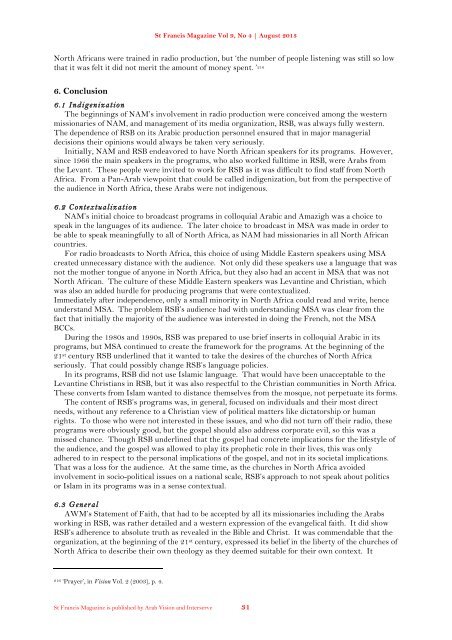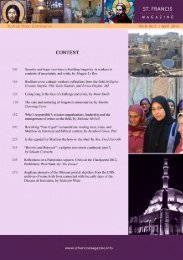Download the pdf - St.Francis Magazine
Download the pdf - St.Francis Magazine
Download the pdf - St.Francis Magazine
You also want an ePaper? Increase the reach of your titles
YUMPU automatically turns print PDFs into web optimized ePapers that Google loves.
<strong>St</strong> <strong>Francis</strong> <strong>Magazine</strong> Vol 9, No 4 | August 2013<br />
North Africans were trained in radio production, but ‘<strong>the</strong> number of people listening was still so low<br />
that it was felt it did not merit <strong>the</strong> amount of money spent. ’ 216<br />
6. Conclusion<br />
6.1 Indigenization<br />
The beginnings of NAM’s involvement in radio production were conceived among <strong>the</strong> western<br />
missionaries of NAM, and management of its media organization, RSB, was always fully western.<br />
The dependence of RSB on its Arabic production personnel ensured that in major managerial<br />
decisions <strong>the</strong>ir opinions would always be taken very seriously.<br />
Initially, NAM and RSB endeavored to have North African speakers for its programs. However,<br />
since 1966 <strong>the</strong> main speakers in <strong>the</strong> programs, who also worked fulltime in RSB, were Arabs from<br />
<strong>the</strong> Levant. These people were invited to work for RSB as it was difficult to find staff from North<br />
Africa. From a Pan-Arab viewpoint that could be called indigenization, but from <strong>the</strong> perspective of<br />
<strong>the</strong> audience in North Africa, <strong>the</strong>se Arabs were not indigenous.<br />
6.2 Contextualization<br />
NAM’s initial choice to broadcast programs in colloquial Arabic and Amazigh was a choice to<br />
speak in <strong>the</strong> languages of its audience. The later choice to broadcast in MSA was made in order to<br />
be able to speak meaningfully to all of North Africa, as NAM had missionaries in all North African<br />
countries.<br />
For radio broadcasts to North Africa, this choice of using Middle Eastern speakers using MSA<br />
created unnecessary distance with <strong>the</strong> audience. Not only did <strong>the</strong>se speakers use a language that was<br />
not <strong>the</strong> mo<strong>the</strong>r tongue of anyone in North Africa, but <strong>the</strong>y also had an accent in MSA that was not<br />
North African. The culture of <strong>the</strong>se Middle Eastern speakers was Levantine and Christian, which<br />
was also an added hurdle for producing programs that were contextualized.<br />
Immediately after independence, only a small minority in North Africa could read and write, hence<br />
understand MSA. The problem RSB’s audience had with understanding MSA was clear from <strong>the</strong><br />
fact that initially <strong>the</strong> majority of <strong>the</strong> audience was interested in doing <strong>the</strong> French, not <strong>the</strong> MSA<br />
BCCs.<br />
During <strong>the</strong> 1980s and 1990s, RSB was prepared to use brief inserts in colloquial Arabic in its<br />
programs, but MSA continued to create <strong>the</strong> framework for <strong>the</strong> programs. At <strong>the</strong> beginning of <strong>the</strong><br />
21 st century RSB underlined that it wanted to take <strong>the</strong> desires of <strong>the</strong> churches of North Africa<br />
seriously. That could possibly change RSB’s language policies.<br />
In its programs, RSB did not use Islamic language. That would have been unacceptable to <strong>the</strong><br />
Levantine Christians in RSB, but it was also respectful to <strong>the</strong> Christian communities in North Africa.<br />
These converts from Islam wanted to distance <strong>the</strong>mselves from <strong>the</strong> mosque, not perpetuate its forms.<br />
The content of RSB’s programs was, in general, focused on individuals and <strong>the</strong>ir most direct<br />
needs, without any reference to a Christian view of political matters like dictatorship or human<br />
rights. To those who were not interested in <strong>the</strong>se issues, and who did not turn off <strong>the</strong>ir radio, <strong>the</strong>se<br />
programs were obviously good, but <strong>the</strong> gospel should also address corporate evil, so this was a<br />
missed chance. Though RSB underlined that <strong>the</strong> gospel had concrete implications for <strong>the</strong> lifestyle of<br />
<strong>the</strong> audience, and <strong>the</strong> gospel was allowed to play its prophetic role in <strong>the</strong>ir lives, this was only<br />
adhered to in respect to <strong>the</strong> personal implications of <strong>the</strong> gospel, and not in its societal implications.<br />
That was a loss for <strong>the</strong> audience. At <strong>the</strong> same time, as <strong>the</strong> churches in North Africa avoided<br />
involvement in socio-political issues on a national scale, RSB’s approach to not speak about politics<br />
or Islam in its programs was in a sense contextual.<br />
6.3 General<br />
AWM’s <strong>St</strong>atement of Faith, that had to be accepted by all its missionaries including <strong>the</strong> Arabs<br />
working in RSB, was ra<strong>the</strong>r detailed and a western expression of <strong>the</strong> evangelical faith. It did show<br />
RSB’s adherence to absolute truth as revealed in <strong>the</strong> Bible and Christ. It was commendable that <strong>the</strong><br />
organization, at <strong>the</strong> beginning of <strong>the</strong> 21 st century, expressed its belief in <strong>the</strong> liberty of <strong>the</strong> churches of<br />
North Africa to describe <strong>the</strong>ir own <strong>the</strong>ology as <strong>the</strong>y deemed suitable for <strong>the</strong>ir own context. It<br />
216 ‘Prayer’, in Vision Vol. 2 (2003), p. 4.<br />
<strong>St</strong> <strong>Francis</strong> <strong>Magazine</strong> is published by Arab Vision and Interserve 31







![Reflections on Surah Fatiha and the Lord's Prayer[1] - St.Francis ...](https://img.yumpu.com/49377951/1/184x260/reflections-on-surah-fatiha-and-the-lords-prayer1-stfrancis-.jpg?quality=85)









